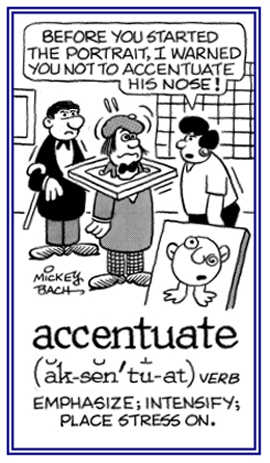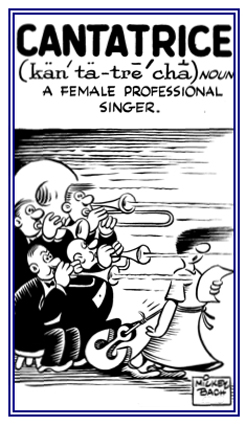cant-, chant-
(Latin: sing, singing; a song)
1. A stress on a syllable to aid in the pronunciation of words; stress, emphasis: "The word 'woman' has its accent on the first syllable."
2. Pronunciation, enunciation, or modulation of speech: "Kent speaks with a Spanish accent."
3. A hint, touch, detail; trimming: "The room was painted white with a few blue accents."
4. Etymology: from about 1538, "a particular mode of pronunciation"; from Middle French (about 1400-1600) accent, from Old French (about 900-1400) acent; which came from Latin accentus, "song added to speech"; from ad-, "to" + cantus, "a singing", past participle of canere, "to sing".
2. Pronunciation, enunciation, or modulation of speech: "Kent speaks with a Spanish accent."
3. A hint, touch, detail; trimming: "The room was painted white with a few blue accents."
4. Etymology: from about 1538, "a particular mode of pronunciation"; from Middle French (about 1400-1600) accent, from Old French (about 900-1400) acent; which came from Latin accentus, "song added to speech"; from ad-, "to" + cantus, "a singing", past participle of canere, "to sing".
Loan-translation of Greek prosoidia, from pros-, "to" + oide, "song", which apparently described the pitch scheme in Greek verse.
The decorating sense of "something that emphasizes or highlights" is from 1972. The verb meaning "to pronounce with an accent or a stress" is first recorded in 1530.
accentual (adjective), more accentual, most accentual
1. A reference to something to make it more noticeable: Harriet likes to wear accentual clothes that attract attention.
2. Descriptive of a metric system based on the number of stresses in a poetic line: The poem that Mike read had an accentual structure instead of the number of syllables in a line.
3. Regarding the involvement, or associated with stress of pronunciation: Lynn spoke certain words and phrases in an accentual manner in her speech in order to make specific and important points clear to the audience.
2. Descriptive of a metric system based on the number of stresses in a poetic line: The poem that Mike read had an accentual structure instead of the number of syllables in a line.
3. Regarding the involvement, or associated with stress of pronunciation: Lynn spoke certain words and phrases in an accentual manner in her speech in order to make specific and important points clear to the audience.
accentuate (verb), accentuates; accentuated; accentuating
1. To make a feature of something more noticeable: The company administrators were convinced that the newspaper article accentuated and emphasized the positive aspects of their financial investments.
2. To emphasize a syllable, word, or phrase when saying it: When Mary spoke, she tended to accentuate her words with French pronunciations.
3. Etymology: known from 1731, from Medieval Latin (written and spoken from 700 to 1500) accentuatus, past participle of accentuare, "to accent", from Latin accentus, "song added to speech"; from ad-, "to" + cantus, "a singing"; past participle of canere, "to sing".

© ALL rights are reserved.
Go to this Word A Day Revisited Index
2. To emphasize a syllable, word, or phrase when saying it: When Mary spoke, she tended to accentuate her words with French pronunciations.
3. Etymology: known from 1731, from Medieval Latin (written and spoken from 700 to 1500) accentuatus, past participle of accentuare, "to accent", from Latin accentus, "song added to speech"; from ad-, "to" + cantus, "a singing"; past participle of canere, "to sing".

Go to this Word A Day Revisited Index
so you can see more of Mickey Bach's cartoons.
1. The use or application of stresses on certain syllables in words when spoken or written: "The word before has the accentuation on the last syllable."
2. The act of giving special importance or significance to something: "There was a great deal of accentuation on learning more vocabulary in Mr. Rodger's class."
2. The act of giving special importance or significance to something: "There was a great deal of accentuation on learning more vocabulary in Mr. Rodger's class."
Tone, melody: "In Roman Catholic churches, The accentus is part of the church music, in which the liturgy of the Mass is chanted by the priest and his assistants at the altar."
Melody or sweet singing.
canorous (adjective), more canorous, most canorous
Singing, melodious, harmonious, musical; resonant, ringing.
canorously (adverb), more canorously, most canorously
Singing, melodious; resonant, ringing: "Sam chooses his language for its rich canorousness rather than for intensity of meaning."
1. A boring kind of speech that is filled with clichés and platitudes.
2. Insincere talking; especially, regarding morals or religion.
3. Jargon or the special language or vocabulary of a particular group; especially, a group that some people look down on or lack respect for.
4. Etymology: "insincere talk" from 1709; earlier, in 1567, it was slang for "whining of beggars; from Old North French (dialect of northern France before the 1500s) canter, "to sing, to chant", from Latin cantare, canere, "to sing".
2. Insincere talking; especially, regarding morals or religion.
3. Jargon or the special language or vocabulary of a particular group; especially, a group that some people look down on or lack respect for.
4. Etymology: "insincere talk" from 1709; earlier, in 1567, it was slang for "whining of beggars; from Old North French (dialect of northern France before the 1500s) canter, "to sing, to chant", from Latin cantare, canere, "to sing".
cant (verb), cants; canted; canting
1. To talk in a pleading or a whining manner.
2. To speak sanctimoniously or to pretend to mean something, but not being sincere: "If the administrators of the company would quit canting about honest work and be examples of the process, they might achieve their objectives."
2. To speak sanctimoniously or to pretend to mean something, but not being sincere: "If the administrators of the company would quit canting about honest work and be examples of the process, they might achieve their objectives."
A professional female singer; especially, of opera: Ms. MacDonald was a famous cantatrice who sang in operas and also in films.

© ALL rights are reserved.
Go to this Word A Day Revisited Index

Go to this Word A Day Revisited Index
so you can see more of Mickey Bach's cartoons.
1. A song or chant; especially, a hymn containing words derived from the Bible, used in some Christian liturgies.
2. Etymology: from Latin canticulum, "little song".
2. Etymology: from Latin canticulum, "little song".
1. A section out of several into which a long poem may be divided or one of the principal divisions of a long poem.
2. Etymology: from 1590, from Latin cantus, "song".
2. Etymology: from 1590, from Latin cantus, "song".
As "a section of a long poem" was used in Italian by Dante and in English first by Spenser.
chant (verb), chants; chanted; chanting
1. A phrase or slogan repeatedly and rhythmically spoken, often with a simple singsong intonation, especially in unison by a crowd or group.
2. Something spoken monotonously or repetitiously; such as, a monotonous or repetitive song or intonation of the voice.
3. Music with a religious text or a set of words or syllables sung on the same note, or a single word or syllable sung on a series of notes.
5. Etymology: from Old French chanter, from Latin cantus, past participle stem of canere, "to sing".
2. Something spoken monotonously or repetitiously; such as, a monotonous or repetitive song or intonation of the voice.
3. Music with a religious text or a set of words or syllables sung on the same note, or a single word or syllable sung on a series of notes.
Chants are used in psalms, canticles, and other parts of some religious services.
4. A psalm, prayer, or other religious text sung as a chant or repeatedly and rhythmically uttered.5. Etymology: from Old French chanter, from Latin cantus, past participle stem of canere, "to sing".

